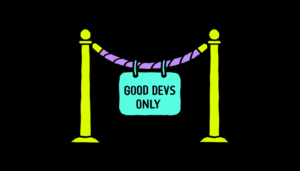Quick Answer:
The highest-paying jobs in software engineering are security engineers, who earn $150K-$247K per year; data architects, who earn $155K-$238K per year; and site reliability engineers, who earn $123K-$229K per year.
Your business is thriving, but with growth comes growing pains. As you find more customers, increased software traffic can cause your tools to break or slow down. Software engineers create solutions that help you scale, develop new products, increase efficiency, and more.
But, the number of developers who declined jobs due to unmet rate expectations nearly doubled from 2022 to 2024, highlighting the need for employers to anticipate potential hires’ motives.
Before you begin hiring, learning about the highest-paying software engineering jobs is important to inform decisions like whether to hire a software engineer from a third party or seek a full-time hire.
To help you achieve greater success, we’re covering everything you should know, from what each role can accomplish to which factors you should consider in the hiring budget for a developer.
What Are The Top-Paying Software Engineering Roles?
Software engineering roles typically pay well because they require specialized skills and knowledge. However, salary depends on a developer’s specialty, past experiences, tools, and location. A software engineer rate calculator can give you an idea of how much to budget for a new hire’s salary based on these factors.
We’ll also dive deep into each of the top-paying coding jobs below so you can determine what you’re looking for and how they can meet your needs.
1. Full-Stack Developer
Full-stack developers are well-rounded software developers with experience in front-end, back-end, and data management. If your team is small and you need a jack-of-all-trades, a full-stack developer can help you with various projects.
Full-stack developers are often the first hire for startups on their development team because they have experience with several types of projects and tools. However, if you’re working on a very complex or niche project, a full-stack developer might not have the expertise to complete it.
Best for: Platform development, API development and integration, minimum viable product (MVP) development
Salary insights: $95K-$170K/yr
Required skills:
- Proficiency in front-end development
- Proficiency in back-end development skills
- Proficiency in database management
- Basic understanding of DevOps principles
2. DevOps Engineer
Development operations (DevOps) engineers improve accuracy and efficiency as software is developed and implemented. They mediate the relationship between other developers and operations teams, maintaining infrastructure and checking projects as they’re updated.
DevOps engineers help oversee the work of other software engineers on a project. They can test the code, create frameworks to ensure it doesn’t break after updates, and test the security of your projects, depending on what you’re looking for.
Best for: Cloud infrastructure automation, infrastructure as code (IaC) implementation, continuous integration/continuous deployment (CI/CD)
Salary insights: $118K-$176K/yr
Required skills:
- Containerization and orchestration
- Cloud platform expertise
- Scripting and automation
3. AI Developer
AI can simplify many tasks but doesn’t just spring from the cloud. AI developers create AI models to use internally for custom tools, as features for your product, or even for research purposes.
AI developers may have expertise in one type of AI processing model. The most common ones include:
- Natural language processing (NLP): The AI is trained on large, language-based data sets to create language-based output. This is how Chat-GPT works.
- Predictive analytics: The AI is trained in statistical analysis to predict outcomes. This is how AI-based financial forecasting works.
- Computer vision: The AI is based on image recognition and powers reverse image searching.
Best for: Chatbot development, AI-powered automation
Salary insights: $116K-$180K/yr
Required skills:
- Machine learning fundamentals
- Deep learning frameworks
- Programming for AI/ML
4. Blockchain Developer
Blockchain developers play a major role in maintaining security in verticals requiring high discretion levels, like finance or crypto. Blockchain is decentralized across a computer network, which blocks individual users from changing the data, ensuring high security.
Due to this nature, it takes someone with experience to create and maintain blockchain-based projects. Blockchain developers can build tools that securely interact with or extract information from the blockchain if your project deals with financial data, user information, or any other sensitive subjects.
Best for: Decentralized application (dApp) development, cryptocurrency or token development
Salary insights: $115K-$191K/yr
Required skills:
- Blockchain fundamentals
- Cryptography and security
- Knowledge of blockchain platforms
5. Cloud Engineer
Cloud engineers specialize in computing and coding for cloud-based solutions. The cloud enables better scalability for projects, and cloud engineers have the expertise to minimize growing pains during this process.
A lack of experience could lead to security issues with cloud-based software. This role focuses on reliability and security to ensure a project stays secure without compromising performance from start to finish.
Best for: Cloud migration, building scalable cloud architectures, cloud security
Salary insights: $123K-$194K/yr
Required skills:
- Cloud platform expertise
- Infrastructure as code (IaC)
- Automation and scripting
6. Embedded Systems Engineer
Embedded systems engineers work on software with a single function within a large device, such as temperature regulation in heating equipment. These engineers work with software and hardware, requiring coding and “hands-on” expertise.
Their role is to create and maintain features of their specific project without impacting how the rest of the system operates. For example, they could automate temperature regulation so that cooling systems engage if equipment overheats rather than shutting the system down.
Best for: IoT device firmware development, real-time operating system (RTOS) integration, development for microcontrollers and microprocessors
Salary insights: $129K-$204K/yr
Required skills:
- Hardware-software interface
- Device driver development
- Debugging and testing of embedded systems
7. Data Scientist
Data scientists create code to process and interpret complex datasets. This role combines coding, statistics, machine learning, and AI to create models that interpret these datasets.
For example, a data scientist might create code to turn raw financial data into visualizations that can communicate important information to stakeholders or inform financial planning.
Best for: Customer segmentation and behavior analysis, sales forecasting, A/B testing analysis
Salary insights: $132K-$213K/yr
Required skills:
- Statistical analysis
- Data cleaning
- Programming for data science
8. Machine Learning Engineer
A machine learning engineer works specifically with machine learning models. Machine learning is similar to AI but can learn and improve decision-making as it processes more data.
Machine learning solutions can be very flexible because they become more accurate over time. Machine learning engineers build these valuable tools and conduct routine maintenance to keep them on track.
Best for: Implementing predictive maintenance solutions, fraud detection systems
Salary insights: $136K-$216K/yr
Required skills:
- Machine learning model development and evaluation
- Model deployment and scaling
- MLOps practices
9. Site Reliability Engineer (SRE)
As you might guess from the name, site reliability engineers use their expertise to conduct maintenance and prevent potential issues before they occur.
They create and leverage custom automation to identify and resolve potential problems or alert the wider team. This keeps your product going, prevents outages, and creates a better user experience.
Best for: Implementing service level objectives (SLOs) and service level indicators (SLIs), automating incident response
Salary insights: $123K-$229K/yr
Required skills:
- Monitoring and alerting
- Incident response and post-mortem analysis
- Capacity planning and performance optimization
10. Data Architect
Data architects own data management, from creating warehousing solutions to cleaning, transformation, and translation.
Different models or systems may require different inputs, and the data architect ensures that data is secure from bad actors but legible for the appropriate internal systems.
Best for: Designing a data warehouse, implementing data governance and security policies
Salary insights: $155K-$238K/yr
Required skills:
- ETL (extract, transform, load) and ELT (extract, load, transform) pipeline design
- Database technologies expertise
- Data governance and security
11. Security Engineer
A security engineer’s sole responsibility is to protect your company’s data. They look for system vulnerabilities, create patches, and are the first line of defense if there’s an incident.
This is one of the highest-paying jobs because it involves prevention and response, honing in on potential security risks and mitigating the effects of incidents if targeted attacks or data leaks occur.
Best for: Vulnerability assessment and penetration testing, implementing security information and event management (SIEM) systems
Salary insights: $150K-$247K/yr
Required skills:
- Network, cloud, and application security
- Vulnerability management and incident response
- Threat modeling
Highest Paying Roles Comparison Chart
Different software engineer jobs come with their own salary expectations. Typically, they’ll pay more as the role becomes more specialized. Below, we recount each role’s average salary range in the United States.
Role
Salary Insights
Full-Stack Developer
$95K-$170K/yr
DevOps Engineer
$118K-$176K/yr
AI Developer
$116K-$180K/yr
Blockchain Developer
$115K-$191K/yr
Cloud Engineer
$123K-$194K/yr
Embedded Systems Engineer
$129K-$204K/yr
Data Scientist
$132K-$213K/yr
Machine Learning Engineer
$136K-$216K/yr
Data Architect
$155K-$238K/yr
Security Engineer
$150K-$247K/yr
How Do Annual Wages for Developers Vary by Industry?
Wages for software developers can also change depending on the industry, but how do these all shake out? Insights from the Bureau of Labor Statistics (BLS) reveal these average salaries for each common industry:
- Software publishers: $143,210
- Manufacturing: $138,100
- Finance and insurance: $132,900
- Management of companies and enterprises: $131,370
- Computer systems design and related services: $127,880
You might be surprised that the computer systems industry is the lowest-paying industry. Think about it this way. Twenty years ago, simpler computers were just coming into homes, with so much room for new features and growth.
Now, software is where the money is at. This makes sense—almost all software providers have switched to cloud-based models. Computer systems are de-prioritized because there aren’t as many hardware changes in the industry for software engineers to workshop.
The manufacturing industry has been trailing closely behind software for the past few years, triggering many wake-up calls that manufacturing tech is lagging. This has led to a higher demand for manufacturing software engineers to streamline and optimize operations.
Factors Contributing to High Salaries
Familiarize yourself with the factors that contribute to higher software engineer salaries. Before beginning the software developer hiring process, consider these factors to determine the appropriate salary for the role.
- High demand: Are you looking for support in a fast-developing field? The role will need a higher salary to set it apart if there are many similar job postings.
- Specialized skills: Does the role require specialized skills or experience? If yes, the salary should be higher.
- Strategic importance: How important is the developer’s role to company success? If they’re closely tied, the salary should be higher.
- Company size and type: Developers in different industries will have different salary expectations. They may expect higher pay from larger organizations that presumably have more resources.
- Location: Developers in areas with higher living costs will expect a higher wage.
Quick Tips for Hiring High-Paying Engineering Roles
Hiring software engineers can be a different beast compared to other hiring processes. Consider the following factors to make the project or role more enticing for developers:
- Leverage remote work flexibility: Flexible or remote work options can make a role more attractive to potential employees. Remote developers might take lower payment if they get increased flexibility.
- Focus on skills over experience: Many developers are self-taught, so focus on their capabilities rather than past roles. Tests and sample projects can help you find someone with the needed skills.
- Consider contract or project-based work: Contracts might be a better option for your company if you have changing needs and different types of projects.
- Tap into niche talent pools: Platforms or companies like Lemon.io vet talent for you to take the guesswork out of hiring the right fit.
Lemon.io Helps Businesses Find Developers
Finding the right fit in some of the highest-paying software engineering jobs can be difficult. If you’re not sure who can get the job done within your budget, working with a hiring platform for developers can help you make a more informed decision to get your project done right.
Hire developers with Lemon.io to find the right candidate to complete your project without hassle. We have a stringent vetting process and a team of over 1,500 expert developers, helping you find the right fit for any project.
Frequently Asked Questions
What are the Highest-Paid Skills in Software Engineering?
The highest-paid skills in software engineering are those in emerging or high-priority fields such as AI, cybersecurity, machine learning, and cloud computing.
Which Companies Pay Software Engineers the Highest Salaries?
Large tech giants tend to pay software engineers the highest salaries. This includes companies like Meta, Apple, and Amazon.
Which Field of Software Engineering Is Most in Demand?
Full-stack developers are the most in-demand right now because they have well-rounded skills to tackle various project types.
Does Location Affect Software Engineering Salaries?
Yes, location affects software engineering salaries. Roles in areas with higher living costs tend to have higher wages than those with lower living costs. Some may find it surprising that Eastern European developers are well-known for their expertise and typically live in lower-cost-of-living areas.









